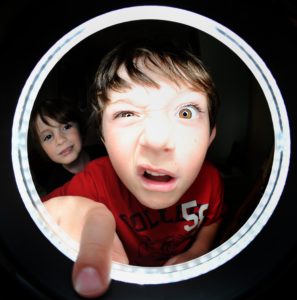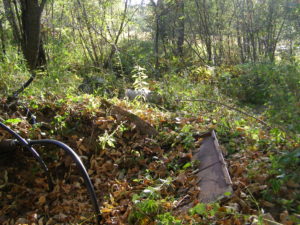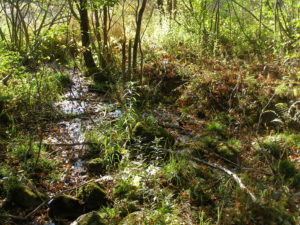by Jenny Rose | Oct 26, 2017 | A Flourishing Woman, Mind
I went to the dentist last week. I spent the usual hour with the hygienist and then the dentist breezed in to give me four or five minutes of exam, comment, teaching and friendly conversation. Thankfully, I don’t require more than this, as my teeth are in excellent shape. In the course of those few minutes, I used the term “permaculture,” and he asked me what it was. I gave him a brief answer, and on the way out the hygienist said I had a “high dental IQ.”
“She has a high IQ, period,” he responded as he left.
I almost got out of the chair and went after him to explain that I’m the dumb one in the family, and certainly don’t have a high IQ.
As I’ve gone about life since then, I’ve thought a lot about that interaction. I’ve also been feeling massively irritated, isolated and discouraged. This morning I woke out of a dream of being in a closet groping for my gun, my knife, even my Leatherman, absolutely incandescent with rage, because a man outside of the closet was having a dramatic and violent meltdown, intimidating everyone present because of something I’d said or done that he didn’t like.
I wasn’t intimidated. I was royally pissed off.
When I had my weapons assembled, I stormed out of the closet and came face-to-face with a clearly frightened woman who was wringing her hands and making excuses for the behavior of the yelling man. I screamed into her face that he could take his (blanking) opinions and shove them up his (blanking blank) and unsheathed my knife, not because of her, because of HIM.
I woke abruptly at that point and thought, I’m not depressed, I’m MAD!

Photo by Nicole Mason on Unsplash
While I showered and cooked breakfast I sifted through IQ and conformity and cultural and family rules, economic success and failure, work, invalidation and silencing and keeping myself small. I thought of how pressured I’ve always felt to toe the line, be blindly obedient, follow the rules, ask no questions and be normal. Normal, as in compliant, and refraining from challenging the multitude of life’s standard operating procedures that “everyone knows.” Normal, as in not daring to resist, persist, poke, peel away, uncover. Normal, as in never, NEVER expressing curiosity, a thought, an experience, a feeling or an opinion that might make someone uncomfortable. Normal, as in never admitting that the way we’re supposed to do things doesn’t always work for me, and frequently doesn’t appear to work for others, either. I slammed around the kitchen, turning all this over in my mind, letting the bacon burn, and finally pounced on a keystone piece to write about.
What does it mean to be smart? Why do I feel like a lying imposter when someone makes a casual comment about my IQ? Why is IQ even a thing? Why does so much of my experience consist of “sit down and shut up!”?
Intelligence is defined on an Internet search as “the ability to acquire and apply knowledge and skills.” Please note the absence of any kind of test score in that definition. Likewise, there’s no mention of economic status, educational status or social status. Also, this definition says nothing about intelligence as a prerequisite for being a decent human being.
The definition takes me back to the playing field in which I wrote last week’s post on work. Here again we have a simple definition for a word which is positively staggering under assumptions and connotations.
Fine, then. I’ve explored what work means to me. What does intelligence mean to me?
Intelligence means the ability to learn, unlearn and relearn. Good learners do not sit down and shut up. We question, and we go on questioning until we’re satisfied with answers. We try things, make hideous mistakes, think about what went wrong and apply what we learned. We don’t do the same thing over and over and expect a different result. We exercise curiosity and imagination. We pay attention to what others say and do and how it all works out. We pay attention to how we feel and practice telling ourselves the truth about our experience. After a lot of years and scar tissue, we learn to doubt not only our own assertions, beliefs and stories, but everyone else’s as well. We practice being wrong. We become experts in flexible thinking. We adapt to new information.
We give up arguing with what is.
Intelligence endures criticism, judgement, abuse, taunts, threats, denial and contempt. It’s often punished, invalidated and invisible. Intelligence takes courage.

Photo by Cristina Gottardi on Unsplash
Intelligence is power. It does not sit at the feet of any person, ideology, rule or authority and blindly worship. It retains the right to find out for itself, feel and express its own experience, define its own success, speak its truth in its own unique voice, and it remembers each of us is limited to one and only one viewpoint in a world of billions of other people.
Intelligence is discerning the difference between the smell of my own shit and someone else’s.
For me, intelligence is a daily practice. It’s messy and disordered and fraught with feeling. It means everything is an opportunity to learn something new. Everything is something to explore in my writing.
I have no idea what my IQ is, and I don’t much care. I’m sick and tired of all the family baggage I’ve carried around about who’s smart and who isn’t and how we all compare. Honestly. What am I, 10 years old? Enough, already.
I’m also fed up with being silenced, and in fact I’ve already refused to comply with that, as evidenced by this blog. I understand a lot of people don’t want to deal with uncomfortable questions. Too bad. Those folks are not going to be my readers. It’s not my job to produce sugar-coated bullshit that can’t possibly threaten or disturb anyone.
So there it is. The practice of intelligence.

Photo by frank mckenna on Unsplash
All content on this site ©2017
Jennifer Rose
except where otherwise noted
by Jenny Rose | Oct 5, 2017 | Emotional Intelligence, Feelings, Love
A few weeks ago I wrote about romance and in that post I confessed that at this point in my life I’m not sure what love actually is. A strange admission from a reasonably intelligent, well-educated, middle-aged broad with two marriages and two children in her history.
Writing that post enabled me to clearly separate romance from love; though I suppose love might include a little romance from time to time. I’m convinced romance is not synonymous with love, however. I began to make a mental list of what love is not, as I often approach things from the back door first. Love is not a synonym for:
- Romance
- Sex
- Slavery
- Control
- Possession
- Obsession
- A suicide pact
- Abuse
- Fear
- Duty
- Obligation
- Enabling
- Obedience
All right. So what is love? My Randall House Collegiate Dictionary says it’s “a profoundly tender, passionate affection for a person” or “a feeling of warm personal attachment or deep affection.” This definition doesn’t satisfy me at all. My rewrite is that love is a feeling of warm, tender connection and deep affection. I don’t think love is always passionate and I don’t like the word attachment. If anything, love implies to me an attitude of nonattachment.
But what about unrequited love? What about failed love or withdrawn love or love as a weapon or a tool? What about the inability to accept love, or feeling unloved though being told we are? What about those who make us feel our love is ugly, twisted, shameful or inadequate?
I’m always playing with words in my head. This week it’s “What is love?” and “What is a crone? and “What are the differences between compassion, empathy and sympathy?” I lie down with those inquiries and wake up with them. I turn them over while I shower, cook bacon, wash dishes, take my morning walk, practice Tai Chi and drive to town. I’m constantly scribbling notes.
I gave a neighbor a lift this morning and asked him to talk to me about compassion, sympathy and empathy. Poor man. He didn’t know what to make of me.
Yesterday, during my frosty morning walk, I dove into a stand of staghorn sumac below the barn and went to visit the spring. This is a daylight spring seeping out of the hill on which the barn and house stand. A long time ago, someone dug a well there, and at one time a pump and tank were installed, along with a system of black plastic outdoor lines to carry water to and from the barn, the garden, and down through the woods to, presumably, crops in the fields below. All the equipment is many decades old now, fallen over and covered with leaves and moss. The well is protected by a round cement cap, much too heavy for me to lift alone (drat!).

Spring
This spot is hidden in a thick tangle of vine, briar and trees. We rarely go in there, though it’s in close proximity to the barn.
It’s fall and it’s been dry, but the drainage where the spring emerges is clearly marked by rocks and moss. The ground underfoot felt soft, and when I brushed away the leaves I found moist earth. A yard or two below that is mud, and then a trickle of water and then, at the bottom of the hill, a quiet film of water, barely moving, reflecting the tree-laced sky. Right now It’s full of apples dropped from an apple tree that grows alongside it.
As I slipped and slid, tripping over vines and getting scratched by hawthorn and raspberry bushes, feeling the velvety moss coating the rocks and stepping cautiously on rotting wood, it occurred to me that love is like this spring.
I’ve always thought of love as an action verb, something I do to another in exchange for receiving the same. I thought I knew what I meant when I used the word, though I was never challenged to define it exactly. For me it’s been a catch-all term, synonymous with dozens of other, more specific actions: Want, need, desire, honor, trust, respect, care about, listen to, defend, make excuses for, enable, protect, support, believe in, etc., etc.
But what if love is just being? What if it has no object, but just is?

Spring
This little spring is absolutely true to itself. Water drains off the hillside above us and carves a path through the earth and rock until it emerges and runs down the surface at the foot of the hill. We pay no attention to it whatsoever. It’s reliable, predictable and faithful, but not because anyone is looking. Its unobtrusive, quiet presence has created a lush pocket of life, a complex system of plants, fungi, animals and insects, but ten yards away on the open hillside it’s invisible.
What if I make a choice to allow my feeling of love to run through my life in the same way the spring runs through and over the ground? What if I carry within me a wellspring, a hidden cleft, moist, fertile, filled with life, rich in sensuality, simply because it’s an expression of self? If others find their way to it, sit a while, bathe, drink, and allow it to nourish and refresh them, they’re welcome. If others can’t see it, or don’t value it, or dislike the perfume of rotting wood and leaves or the feel of plush moss under their bare foot, it’s nothing to do with me. Not everyone chooses to make their way through raspberry and hawthorn bushes, after all.
What if I don’t need anything in return because I’m giving nothing away? Perhaps the act of love can be a simple state of being, not a totality, not a hurricane of passion and lust, not a romantic fairytale, not a prison and torture chamber, but a spring, a waterway, a shining thread I can share without depletion. Can I allow it to seep quietly up through the roots of my experience, even if no one else ever finds it, wants it, returns it or deems it acceptable?
Our spring is part of a landscape of field and forest, river, pond and stream, rocky hillside and bog. The landscape contains many forms and embraces many systems of life. Birth and death happen on this land. Disease, erosion and flood happen on this land. Prey and predators carry out their sacred dance of balance here. Blood, bone, fur, feather, antler, musk, urine and feces are all here.
I, too, am a complex system of history, memory, belief, thought and feeling. I do not feel love for everyone and everything. My experience of love is that it’s a wild thing; it seeps up where it will and trickles away without warning, taking no account of rules and expectations. I can’t command it and I don’t choose to hold it back. My love doesn’t need anyone’s reception, appreciation, validation or praise.
Love is. I reserve the right to love as I will. I am the keeper of my own wellspring.

Spring 10/2017
All content on this site ©2017
Jennifer Rose
except where otherwise noted
by Jenny Rose | Aug 17, 2017 | Connection & Community, Emotional Intelligence, Shadows
A good thing happened recently. I declined to take poisoned bait.
The bait arrived in the form of a terse email from an individual with whom I’ve recently done business. I’ve never met them in person. I approached our business transaction with a willingness to negotiate, share power, cooperate and communicate directly, thoroughly and clearly. I saved all documents, contracts and emails regarding our business, and upon successfully (in my view) concluding our interaction, I moved on with a sense of gratitude, satisfaction and relief.
More than a month later, I had an email expressing frustration and blame.
It felt like a slap in the face, unexpected and hurtful.
My immediate impulse was to strike back, followed quickly by the thought that I hadn’t communicated well and I could fix things by explaining myself (again). Obviously, I had been misunderstood.
Then I decided to pause for a day or so and think carefully about this.
The fact is, I have a longstanding deeply-rooted pattern of believing I’ve been misunderstood due to my inept communication. This belief keeps me firmly locked in escalating attempts to explain and be heard and understood. What I’ve failed to perceive, over and over again through the years, is that I’ve frequently been in relationships with people who had no interest in explanations. They were deliberately fostering misunderstanding, drama and conflict because it fed them in some way.
This, by the way, is a very common strategy of narcissists, psychopaths and borderline personality disordered people. I’ve written previously about projection and gaslighting , two tools frequently used to control others.
Deliberately keeping another in confusion and on the defensive, constantly changing the goalposts and passive aggressive tactics like the silent treatment are all baited hooks I’ve eagerly swallowed and writhed on for years. Words can’t convey the anguish and erosion of self that occurs in the context of this kind of long-term abuse. I’ve crept away from relationships like this as nothing more than a cracked shell of woman, my sexuality and femininity withered, my emotions torn to shreds, my body impoverished and barren, and firmly convinced of my own worthlessness, ugliness and inadequacy.

Photo by Hailey Kean on Unsplash
A perfect set-up to fall for it all over again.
And again.
And again.
But not this time!
This time I had hard evidence. Over and over, I checked the timing of contract and closing, emails sent and received, all the fine print. It was all right there, the date my responsibility ended and the date after that of a sudden dissatisfaction I was expected to fix.
I concluded I’d done nothing wrong. On the contrary, I’d consistently demonstrated the kind of integrity I aspire to in every interaction. I went above and beyond. I provided explanation, suggestions for resolution and alternate options, along with names and numbers of possible local resources.
That email was bait.
So, a couple of days later I took a deep breath, opened my email and replied with sincere wishes for happiness and success. One sentence. Then I signed off and hit “send.”
This happened about three weeks ago, and I’ve been thinking about it ever since. It’s a small thing, but it reveals to me how very far I’ve come in healing, growth and wisdom. I now know that I have the power to decline an invitation to struggle. I recognize poisoned bait for what it is. I know it conceals a hook, and that hook no longer tempts me. I don’t need to waste any energy in defense or repeated explanations. I don’t choose to revisit old bones of contention and chaos. I accept that people think what they think, make up and believe the stories they make up and believe, carry the assumptions they carry, and none of it has anything to do with me.
Misunderstanding certainly occurs, but it’s not that difficult to clear up, given two adults who intend to. The trick is to identify as quickly and accurately as possible if the person I’m interacting with is an adult who to intends to clear up misunderstanding. In the case of my email, that person was only peripherally in my life and we’ll probably never interact again, so I didn’t bother. However, we all have people in our lives with whom we have ongoing connection. In those cases, I use a single question to clarify “misunderstanding.”
“Is there anything I can say or do to clear this up and repair our relationship?”
This direct, simple question seems to encourage surprisingly honest answers, albeit answers I haven’t wanted to accept or believe. However, if the answer is some variation of “no,” then everything immediately becomes blessedly clear. I want to repair. They don’t. Continuing to engage is a waste of our mutual time and energy, and if any kind of a hook remains dangling, I know it’s a manipulation. They’ve made up their mind, and I have no power there.

Photo by Joshua Earle on Unsplash
The words on the screen fail to convey the annihilating heartbreak attendant on understanding that someone you care about and even love doesn’t value your relationship enough to make repairs, but arguing with what is has never worked for me, and I think we owe it to ourselves and others to pay attention when people tell us who they are, no matter how devastated we might feel or how much we want to deny what we hear.
I don’t think of this as too-sweet maiden, politically correct, starry-eyed liberal ideology. Neither is it a religious thing for me, or some kind of higher moral ground tactic. It’s not about making nice and giving others the benefit of a doubt, turning the other cheek, or making excuses for why people do the things they do. It’s also not a blanket rejection. I’m perfectly prepared to turn aside into another conversation, activity, or form of connection. I’m also perfectly prepared to walk away.
No. This is about dignity. It’s about wisdom. It’s about self-defense and self-care. Explaining oneself once, apologizing if warranted, taking responsibility if appropriate, is healthy, adult behavior. Distortions, refusing to hear or accept explanations, verbal or physical threats or violence, scenes, emotional meltdowns and shame and blame games are signs and symptoms of dangerously abusive relationships, and I’m no longer available for those.
I’ve changed my diet and I don’t take that poisoned bait anymore.
I’ve had a bellyful of it already.
My daily crime.
All content on this site ©2017
Jennifer Rose
except where otherwise noted
by Jenny Rose | Jul 20, 2017 | A Flourishing Woman, Body

Photo by Leon Liu on Unsplash
Last night we danced. I’m patiently and persistently attempting to root a dance group into this community. It’s taking time, but I hope in the end to have a healthy core of four or five women with whom to share this sacred practice.
As I danced, I remembered an old friend with whom I danced in Colorado. She used to often say, at the end, as we sat in a circle holding hands, “It’s so good to be in the body.”
Not in the head, where family and other relationships, financial and political complexities, expectations, rules, to-do lists and all our internal voices reside, but in the body, right now.
Our bodies contain a childlike innocence and a wisdom beyond words. They communicate to us the truth about how things are with us via feeling and sensation. Patiently, they carry us through our lives, our most loyal and faithful companions. Persistently, we neglect, abandon and abuse them.
Somewhere along the way, we’ve learned to reject, be ashamed of and hate our physical being and experience. Now we’re to the point where bodily functions tied to being biologically female are a matter of political incorrectness and a hate crime. Social pressure is increasing to eradicate the very words that define female physical experience.
But dance is for everybody in every body, and the spiritual practice of dance has taught me to honor, protect and care for my physical self in new ways. There are no labels in dance, no gaslighting, no power-over that seeks to diminish or limit my physical history or expression. Dance is wordless, so there are no language police. Dance is the freedom to belch, to fart, to wiggle, to jiggle, to giggle, to cry, to shout, to play and to sweat.
Allowing my body to be and joyfully inhabiting it has been a powerful act of self-love. It means allowing my hair to grow as it will, where it will, in the color it is. It means moving with dignity and pride. It means gratitude, for my life is a journey mapped onto my flesh. Every mole, freckle, stretch mark, scar, lump, bump, line, wrinkle and vein holds part of my story, and I honor story.
Being in my body is a powerful act of surrender, not to what the culture says I must be or not be, not to what I think I should embody or not embody, but to what I am. Simply that. The unique, miraculous complex system of genetic material, living tissue, viruses, bacteria and chemical processes that I am.
Allowing my body to be is a peace treaty. My body is not for the pleasure or evaluation of others. It’s not for sale. My body and I owe nothing to anyone, not explanation, apology, conformity, obedience and especially not shame. I refuse to go to war over gender, sexuality or political correctness ideology. I decline to support or participate in self-hatred or hatred of other bodies. The power of my body transcends the judgements, criticisms and opinions of others.
The deepest language I know is of the body. Words are inadequate to my passion, to my love, to my creativity. Spoken and written language fails to convey the richness of my body’s capabilities.
The tick crawling high on the nape of my neck along my hairline, the feel of its tiny claws stirring each hair as it seeks a good place to fasten on, gives me a physical experience so vivid and visceral it cannot possibly be conveyed in words. My skin shrinks, telling me what the sensation is before I examine the cause with my eyes. Undisturbed hair around its path rises, quite automatically, in response to the small but ominous trespass. It feels solid and smooth as an apple-seed between my thumb and finger as I pinch it off. It hurries up and down a bookmark, chestnut colored, as I transport it down the stairs, almost as though it knows it’s been seen, recognized and a death sentence passed.
We come out of our favorite restaurant after a meal on a hot, humid day and find a snake clothed in brown and green, voluptuously twined around our right front tire. My partner stoops and grasps it and it curls and writhes as it dangles from his hand, twisting between the newly-laid black tar and the heavy sky, glaring with sun, humid as a steam bath. My partner takes it into a nearby field and as he comes back he holds out his hand with a rueful expression, showing me beads of bright red blood, dazzling as rubies, on his finger, and two parallel shallow cuts that sting, he says, like paper cuts.

Photo by Leon Liu on Unsplash
Last night I danced with the tick, the snake, the rasp on my knee from falling on the front cement steps, their uneveness hidden by the encroaching hostas, blooming now on thick, fleshy stems, their lavender flowers plundered all day by bumblebees.
I danced with the rattling air conditioner lodged into a window of the recreation center activity room. As usual, we traded the rise in heat and humidity in the room with the lower and quieter fan setting.
I danced with a dead fly on the wood floor, trying to avoid stepping on it with my bare foot. I danced with a living large black ant, bewildered, crawling across what must have seemed like acres of flat, featureless terrain, also not wishing to step on it, but too involved in the flow of the music to stop and take it outside.
I danced with my breasts and belly and thighs, with my feet and elbows and wild hair. I danced with trickles of sweat and a wet upper lip. I danced with my tattoo and swaying earrings and sliding silver bangles. I let myself go. I let myself be. I let myself sink into my body as though sinking into a lover’s arms, for I am my body’s lover, and it is mine.
I danced, and remembered again how good it is to be in the body.

Photo by David Hofmann on Unsplash
All content on this site ©2017
Jennifer Rose
except where otherwise noted
by Jenny Rose | Mar 30, 2017 | Emotional Intelligence, Feelings
In the last couple of years, a lid has been gradually slipping off a container in my mind labeled ‘BOREDOM,’ and I suddenly realize the contents of the can are now moving into all the cracks and folds of my memories and experience.
I don’t have much interest in boredom. I’m never bored and I’m greatly irritated by people who are. When I expressed boredom as I child I was either given something “productive” to do or told sometimes everyone has to do things they don’t want to do.
As a parent, when my kids expressed boredom, I gave them a long list of tasks or “productive” things they could do to help me. They usually declined, but they also learned quickly to stop saying they were bored.
I’ve often been told I’m boring.

Photo by Annie Spratt on Unsplash
There. That’s all I have to say about boredom.
Life was much more cut and dried before I became educated in emotional intelligence. Now I’m suspicious of cut and dried, especially if it has to do with feelings, patterns in my life or things that keep showing up. Boredom keeps showing up. People say they’re bored and I feel disgusted. People say they do self-destructive things because they’re bored and that excuse infuriates me. I take the boredom of others personally, as though I’m not entertaining or interesting enough to keep them engaged.
If I’m not interested in boredom, I ask myself, why does it make me so mad, and why does it keep catching my attention?
Why, indeed.
A couple of days ago I decided this week’s post would be about boredom, so I really started to think about it. I tossed around the concept of boredom with my partner. I thought about all the places it’s shown up in past relationships. I sat down and Googled boredom and looked at articles, quotes, memes, images and definitions.
I can’t tell you how often I’ve come to the page, either to write or research about something out there — a behavior or pattern I observe around me in other people — and discovered it’s not out there at all, at least not exclusively. It’s in here.
Remember what I said a minute ago? “I’m never bored.”
I’m suddenly realizing that’s not true. In fact, I suspect I’ve been chronically bored my whole life. The feeling of boredom, along with so many other feelings, simply got denied. It wasn’t until I started living more authentically here in Maine and stopped being bored that I could begin to see the colossal depths of my previous boredom.
Naturally, I’ve felt enraged when others express feeling bored while I can’t.
But why can’t I express it? What’s so shameful about boredom?
Oh, baby.

Photo by Jason Rosewell on Unsplash
First of all, being bored means you’re not working hard enough. You’re not being productive. You’re wasting time. You’re useless! You’re lazy! You’re a quitter! You’re irresponsible! You’re letting others down! You’re not pulling your weight! You’re a burden! You’re a failure! (This eventually trails away into a wild-eyed, gibbering mental shriek.)
When all the arm-waving drooling hysteria stops and I can think rationally again, what I’m left with is BUSY=GOOD and BOREDOM=BAD. This has the look and feel of first-grade logic to me, and I’m skeptical. I’ve spent a lot of my life staying busy in order to please other people and a lot of that busy was dead boring. School, for example. Busy and bored are not opposites. Busy without purpose is a recipe for compulsivity. On the other hand, the condition of being undisturbed and private with a book, paper and writing or coloring pens or even just a window and a cat with nothing in particular to do is a real pleasure.

Photo by Danny Postma on Unsplash
Somehow, somewhere along the way, boredom became the enemy in our culture. It’s a whine, a complaint, a danger and a discomfort to be avoided. It’s a weakness, even a sin (if you think in such terms). Boredom is a condition that must be fixed. Bored children get into trouble. Bored adults are not productive. Boredom is an excuse to use and abuse substance. People eat out of boredom. People have affairs out of boredom. Boredom, in fact, is to blame for a lot of undesirable behavior and choices.
Really? I don’t accept this. I’ve learned feelings — all feelings — can be thought of as value-equal data. We’re human. We have feelings. Some are more uncomfortable than others, but isn’t that largely a product of the thoughts and judgements we attach to them? Feeling a feeling doesn’t mean we have to act it out in ways to hurt others or ourselves. If we make destructive choices, our feelings are not the problem. What we do with our feelings is the problem.
It follows then, if I’m bored and I can call the feeling by name and recognize it, there’s information there for me. What is my boredom telling me? Here are some things I associate with my own boredom:
- I’m not interested.
- I’m not engaged.
- I’m not authentic.
- I don’t feel a connection.
- I can’t make a contribution.
- It’s too easy; I know how to do this; I can do more.
- I don’t understand.
- I’m overstimulated.
- I’m exhausted or ill.
- I’m overwhelmed with some other painful feeling, like fear, rage or grief, I’m refusing to deal with.
- I have a boundary problem; I’m taking on something belonging to someone else.
- I’ve been here and done this — not doing it again!
- My needs are not being met.
- I feel disempowered.
- I’m not in the right place.
- I feel limited.
- I can’t be curious or creative.
- I’m not safe.
This entire list is a map informing me where I’ve been, where I am and where I might go next. The feeling of boredom is the ground I stand on to read the map. My boredom doesn’t need to be fixed. There’s nothing shameful about it. On the contrary, it holds essential information and experience for me. It defines choices and supports power. Busy can’t create this essential space and quiet, but boredom can.
So much for not expressing boredom because it’s bad and busy is good. What else stood in my way all these years?
False Gods.
You see, I’m female. (By which I mean uterus, ovaries and menses.) Good girls, nice girls aren’t bored — ever — by males, including but not limited to male teachers, male family members, male romantic/sexual partners, male classmates and colleagues, and male bosses.
Now, before anyone climbs up on their high horse, understand I don’t hate men. Not at all. I’ve historically gotten along better with men than women, in fact. Also, I know things are different now than they were in the 60s and 70s when I was being socialized — sort of. There’s a lot more awareness and discussion of feminism and sexual politics.
However, a big part of my training had to do with “respect,” (also loyalty, responsibility and duty) and just about the only person not included in those I was taught to “respect” was myself. Respect was demonstrated by things like being silent while the men spoke, obedience, and being properly grateful for and attentive to mansplaining . Respect meant adapting, adjusting, and limiting myself so as not to challenge, threaten or compete with men. My role was to learn to “act like a lady” and be compliant, sweet and attractive.
You might not have noticed, but that training wasn’t notably successful.
Boredom and respect are not a happy team, so of course I kicked boredom to the curb. Respect meant love, validation, tribe, straight A’s, husband, children, a good job and a normal life. Boredom with addiction, violence, abuse, rigid thinking, inability to grow, absent creativity and curiosity, uninspired sex, toddler-level communication skills, power and control games, mind fuckery, omnipresent TV, unending housework and financial grind was absolutely out of the question.
Until now.
As for other people calling me boring, we’ve already covered that in a previous post. It’s a projection. My feeling of boredom is not about others and their boredom is not about me. I’ve been a lot of things in my life, but boring isn’t one of them.
That empty can in my mind labeled ‘BOREDOM’ was filled with something I want and need. Who knew? Going forward, I’m reclaiming my boredom. I’m welcoming it like the wise old friend it is, naming it, honoring it, embracing it, standing hip-deep in it and reading the map of my life to chart a course for what I’d like to do next.
And I will never, ever again try to fix, discourage, stifle, diminish or deny someone else’s boredom. I will instead congratulate them for feeling such a vital, vibrant feeling and ask them my favorite question:
“What would you like to do now?”

Photo by Joshua Rawson-Harris on Unsplash
All content on this site ©2017
Jennifer Rose
except where otherwise noted















